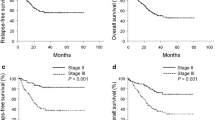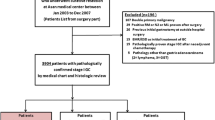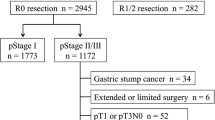Abstract
Background
The benefit of adjuvant treatment in gastric adenocarcinoma was demonstrated by randomized, controlled trials of patients with locally advanced tumors. Thus, its role for stage IIB-IIIC disease is widely accepted. We aimed to identify patients with stage IA-IIA gastric adenocarcinoma who have a poor prognosis and thus may benefit from adjuvant treatment.
Methods
Patients with gastric adenocarcinoma who underwent surgical resection with pathological evaluation of ≥15 lymph nodes and had available disease-specific survival (DSS) data were identified from the Surveillance Epidemiology and End Results Registry. Survival differences were evaluated with the log-rank test and Cox multivariate analysis.
Results
Stage and TN grouping strongly predicted DSS (P < 0.001, P < 0.001). Stage IA tumors had an excellent outcome: 91 ± 1.2 % 5-year DSS. The TN groupings of stages IB and IIA had the next best outcomes with 5-year DSS from 66 ± 4.6 % to 81 ± 2.3 %. Older age (P < 0.001), higher grade (P = 0.004), larger tumor size (P < 0.001), and proximal tumor location (P < 0.001) were independent predictors of worse DSS in stage IB-IIA tumors. We devised a risk stratification scheme for stage IB-IIA tumors where 1 point was assigned for age >60 years, tumor size >5 cm, proximal tumor location, and grade other than well-differentiated. Five-year DSS was 100 % for patients with 0 points; 86 ± 4.3 %, 1 point; 76 ± 3 %, 2 points; 72 ± 2.8 %, 3 points; and 48 ± 4.9 %, 4 points (P < 0.001).
Conclusions
Patients with stage IB-IIA gastric adenocarcinoma and ≥2 adverse features (age >60 years, tumor size >5 cm, proximal location, and high-grade) have 5-year DSS ≤76 %. Adjuvant therapy may be warranted for these patients.



Similar content being viewed by others
References
Parkin DM, Bray F, Ferlay J, Pisani P. Global cancer statistics, 2002. CA Cancer J Clin. 2005;55(2):74–108.
Siegel R, Naishadham D, Jemal A. Cancer statistics, 2012. CA Cancer J Clin. 2012;62(1):10–29.
Edwards BK, Ward E, Kohler BA, et al. Annual report to the nation on the status of cancer, 1975-2006, featuring colorectal cancer trends and impact of interventions (risk factors, screening, and treatment) to reduce future rates. Cancer. 2010;116(3):544–73.
Macdonald JS, Smalley SR, Benedetti J, et al. Chemoradiotherapy after surgery compared with surgery alone for adenocarcinoma of the stomach or gastroesophageal junction. N Engl J Med. 2001;345(10):725–30.
GASTRIC Group, Paoletti X, Oba K, et al. Benefit of adjuvant chemotherapy for resectable gastric cancer: a meta-analysis. JAMA. 2010;303(17):1729–37.
Cunningham D, Allum WH, Stenning SP, et al. Perioperative chemotherapy versus surgery alone for resectable gastroesophageal cancer. N Engl J Med. 2006;355(1):11–20.
Ychou M, Boige V, Pignon JP, et al. Perioperative chemotherapy compared with surgery alone for resectable gastroesophageal adenocarcinoma: an FNCLCC and FFCD multicenter phase III trial. J Clin Oncol. 2011;29(13):1715–21.
Sakuramoto S, Sasako M, Yamaguchi T, et al. Adjuvant chemotherapy for gastric cancer with S-1, an oral fluoropyrimidine. N Engl J Med. 2007;357(18):1810–20.
Nakajima T, Kinoshita T, Nashimoto A, et al. Randomized controlled trial of adjuvant uracil-tegafur versus surgery alone for serosa-negative, locally advanced gastric cancer. Br J Surg. 2007;94(12):1468–76.
Bang YJ, Kim YW, Yang HK, et al. Adjuvant capecitabine and oxaliplatin for gastric cancer after D2 gastrectomy (CLASSIC): a phase 3 open-label, randomised controlled trial. Lancet. 2012;379(9813):315–21.
Roukos DH, Lorenz M, Karakostas K, Paraschou P, Batsis C, Kappas AM. Pathological serosa and node-based classification accurately predicts gastric cancer recurrence risk and outcome, and determines potential and limitation of a Japanese-style extensive surgery for Western patients: a prospective with quality control 10-year follow-up study. Br J Cancer. 2001;84(12):1602–9.
Kooby DA, Suriawinata A, Klimstra DS, Brennan MF, Karpeh MS. Biologic predictors of survival in node-negative gastric cancer. Ann Surg. 2003;237(6):828-35; discussion 835–7.
Baiocchi GL, Tiberio GA, Minicozzi AM, et al. A multicentric Western analysis of prognostic factors in advanced, node-negative gastric cancer patients. Ann Surg. 2010;252(1):70–3.
Stomach. In: Edge SB, Byrd DR, Compton CC, et al., eds. AJCC cancer staging manual. 7th edn. New York: Springer; 2010:120.
Kaplan EL, Meier P. Nonparametric estimation from incomplete observations. J Am Stat Assoc. 1958;53:457–62.
Schuhmacher C, Gretschel S, Lordick F, et al. Neoadjuvant chemotherapy compared with surgery alone for locally advanced cancer of the stomach and cardia: European Organisation for Research and Treatment of Cancer randomized trial 40954. J Clin Oncol. 2010;28(35):5210–8.
Hundahl SA, Phillips JL, Menck HR. The National Cancer Data Base Report on poor survival of U.S. gastric carcinoma patients treated with gastrectomy: Fifth Edition American Joint Committee on Cancer staging, proximal disease, and the “different disease” hypothesis. Cancer. 2000;88(4):921–32.
NCCN Practice Guidelines in Oncology. Gastric Cancer. v2.2011. www.nccn.org.
Knight G, Earle CC, Cosby R, et al. Neoadjuvant or adjuvant therapy for resectable gastric cancer: a systematic review and practice guideline for North America. Gastric Cancer. 2012 Mar 31.
Helsedirektoratet. Nasjonalt handlingsprogram med retningslinjer for diagnostikk, behandling og ppfølging av ventrikkelcancer (kreft i magesekken). www.helsedirektoratet.no.
Landelijke werkgroep Gastro-intestinale Tumoren. Maagcarcinoom v1.0. www.oncoline.nl.
Dudeja V, Habermann EB, Abraham A, Zhong W, Parsons HM, Tseng JF, Al-Refaie WB. Is there a role for surgery with adequate nodal evaluation alone in gastric adenocarcinoma? J Gastrointest Surg. 2012;16(2):238–46; discussion 246–7.
Coburn NG, Govindarajan A, Law CH, et al. Stage-specific effect of adjuvant therapy following gastric cancer resection: a population-based analysis of 4,041 patients. Ann Surg Oncol. 2008;15(2):500–7.
Wang J, Dang P, Raut CP, et al. Comparison of a lymph node ratio-based staging system with the 7th AJCC system for gastric cancer: analysis of 18,043 patients from the SEER database. Ann Surg. 2012;255(3):478–85.
Warneke VS, Behrens HM, Hartmann JT, et al. Cohort study based on the seventh edition of the TNM classification for gastric cancer: proposal of a new staging system. J Clin Oncol. 2011;29(17):2364–71.
Kattan MW, Karpeh MS, Mazumdar M, et al. Postoperative nomogram for disease-specific survival after an R0 resection for gastric carcinoma. J Clin Oncol. 2003;21(19):3647–50.
Acknowledgments
This work is supported by the Department of Veterans Affairs Office of Research and Development through a Career Development Award-2 (JSG).
Disclosures
No Disclosures.
Author information
Authors and Affiliations
Corresponding author
Rights and permissions
About this article
Cite this article
Gold, J.S., Al Natour, R.H., Saund, M.S. et al. Population-Based Outcome of Stage IA-IIA Resected Gastric Adenocarcinoma: Who Should Get Adjuvant Treatment?. Ann Surg Oncol 20, 2304–2310 (2013). https://doi.org/10.1245/s10434-012-2852-y
Received:
Published:
Issue Date:
DOI: https://doi.org/10.1245/s10434-012-2852-y




